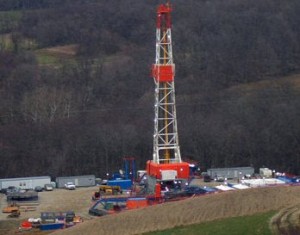June 16 Webinar Explores Air Pollution from Marcellus Gas Activities
 UNIVERSITY PARK, Pa. — A web-based seminar June 16, presented by Penn State Extension, will explore state findings regarding air pollution related to Marcellus Shale natural-gas activity in the commonwealth.
UNIVERSITY PARK, Pa. — A web-based seminar June 16, presented by Penn State Extension, will explore state findings regarding air pollution related to Marcellus Shale natural-gas activity in the commonwealth.In the 1 p.m. webinar, titled “The Pennsylvania Marcellus Shale Short-Term Ambient Air Sampling Project,” Nick Lazor, chief of the Air Quality Monitoring Division of the Pennsylvania Department of Environmental Protection, will discuss findings and conclusions of recent studies of emissions from gas sites.
Mr. Lazor, who has 16 years of environmental experience in the air-quality field, manages a staff of 32 for DEP and is responsible for the operations and maintenance of the commonwealth’s Ambient Air Monitoring Network.
Air pollution from Marcellus Shale activities has been a concern since the beginning of 2008, when natural-gas exploration activities in the Marcellus Shale formation increased significantly in the commonwealth. There have been more than 2,349 wells have been drilled in Pennsylvania, primarily in the southwest, northeast and northcentral regions.
In response to the increased number of well sites and concerns about the impact of the Marcellus Shale natural-gas development activities on air quality, DEP launched a short-term, screening- level air-quality sampling initiative.
Air quality was sampled in DEP surveys at natural-gas facilities in the northcentral, northeast and southwest regions of the state.
“Due to the limited scope and duration of the sampling, and the limited number of sources and facilities sampled, the findings only represent conditions at the time of the sampling and do not represent a comprehensive study of emissions,” stated a report about the air sampling prepared by Mr. Lazor’s group within DEP.
“While this short-term sampling effort does not address the cumulative impact of air emissions from natural gas operations, the sampling results do provide basic information on the type of pollutants emitted to the atmosphere during selected phases of gas extraction operations in the Marcellus Shale formation,” the report noted.
According to the report, key findings of short-term air sampling include:
- Concentrations of certain natural gas constituents — including methane, propane and butane, and associated compounds were detected in the air near Marcellus Shale drilling operations.
- Elevated methane levels were detected at compressor stations and well sites.
- Certain compounds, mainly methyl mercaptan, were detected at levels which generally produce odors.
- Results did not identify concentrations of any compound that would likely trigger air-related health issues associated with Marcellus Shale activities.,
- Sampling for carbon monoxide, nitrogen dioxide, sulfur dioxide and ozone did not detect concentrations above National Ambient Air Quality Standards at any of the sampling sites.
“The elevated methane results at the sampling sites would seem to confirm that the natural-gas production infrastructure in general — from well sites to condensate tank farms to compressor stations — is a source of pollutant emissions through fugitive and/or direct means,” the report stated.
The June16 webinar is part of a series of online workshops addressing opportunities and challenges related to the state’s Marcellus Shale gas boom. Information about how to register for the webinar is available on the webinar page of Penn State Extension’s natural-gas website at http://extension.psu.edu/naturalgas/webinars.
Future webinars will include speakers on the following topics: pipeline development and regulation; a research update on the effects of shale drilling on wildlife habitat; and current legal issues in shale-gas development.
Previous webinars, publications and information on topics such as the gas boom’s effect on landfills, water use and quality, zoning, gas-leasing considerations for landowners, and implications for local communities also are available on the Penn State Extension natural-gas website (http://extension.psu.edu/naturalgas).
For more information, contact John Turack, extension educator in Westmoreland County, at (724) 837-1402 orjdt15@psu.edu .
